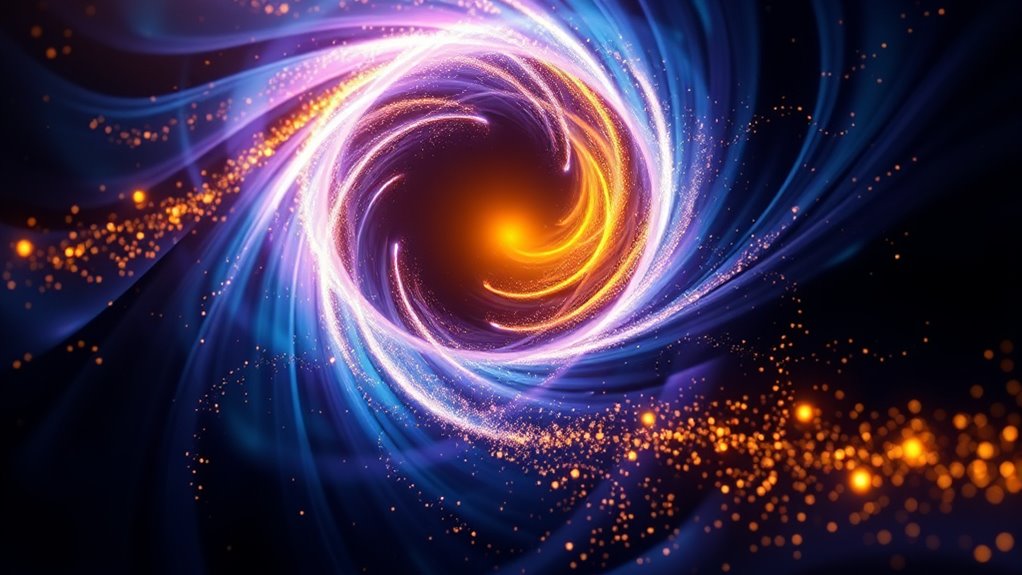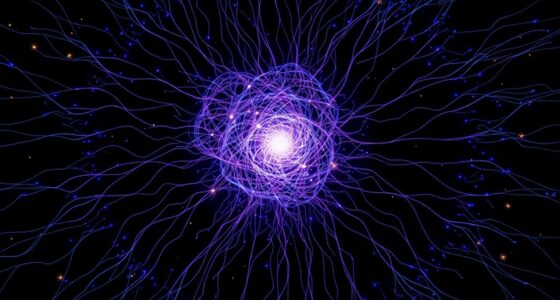Flow states stem from neurochemical changes in your brain, mainly driven by dopamine, which boosts motivation, focus, and feelings of euphoria during deep engagement. When you challenge yourself just enough and align your skills with the task, your brain releases dopamine, creating a rewarding cycle of immersion. Mindfulness techniques help sharpen attention and support these neurochemical processes, leading to powerful spiritual highs. Keep exploring how understanding these forces can deepen your experience.
Key Takeaways
- Neurochemicals like dopamine play a central role in achieving flow and spiritual highs by reinforcing focus and rewarding engagement.
- Flow states involve a neurochemical balance that enhances attention, motivation, and emotional well-being, contributing to spiritual experiences.
- Mindfulness techniques stimulate dopamine release and help the brain enter flow, fostering feelings of transcendence and spiritual connection.
- The alignment of skill level and challenge optimizes neurochemical activity, facilitating immersive, spiritually fulfilling flow states.
- Creating environments that support neurochemical balance and focus enhances the likelihood of experiencing spiritual highs through flow.

Have you ever experienced a moment when everything around you seemed to fade away, and you were completely absorbed in what you were doing? That’s often a sign you’re entering a flow state—where focus becomes effortless, and time seems to distort. Achieving this isn’t purely about luck; it’s deeply rooted in neurochemistry, especially involving dopamine release. Dopamine, often called the “feel-good” neurotransmitter, plays a pivotal role in motivation, reward, and attention. When you’re fully engaged in an activity that challenges you just enough, your brain releases dopamine, reinforcing the behavior and encouraging you to stay immersed. This creates a feedback loop: the more you focus, the more dopamine floods your system, making the experience rewarding and drawing you deeper into the flow.
Entering a flow state boosts focus through dopamine-driven reward and motivation.
To tap into this state intentionally, many people turn to mindfulness techniques. Mindfulness helps you sharpen your attention and eliminate distractions, allowing you to stay present in the moment. Practices like deep breathing, body scans, or focused meditation train your brain to maintain sustained attention. When you cultivate mindfulness, you’re fundamentally teaching your brain to switch its default mode from wandering to staying engaged. This heightened state of awareness facilitates dopamine release in a controlled, healthy way, making it easier to sustain flow. Over time, these techniques don’t just help you achieve flow more readily—they also enhance your overall ability to stay focused and reduce stress. Recognizing the neurochemical factors involved can help you better understand how to optimize your mental state.
Getting into flow isn’t about forcing yourself into a trance; it’s about aligning your skills with the challenge at hand. When you find that sweet spot where your abilities meet the task’s difficulty, your brain naturally releases dopamine, fueling your motivation to continue. The key is to set clear goals, minimize interruptions, and stay present using mindfulness practices. As you develop these habits, your brain becomes more adept at entering flow states, and the neurochemical reward system gets stronger. In essence, you’re rewiring your mental landscape to seek out, recognize, and sustain experiences that trigger dopamine release, fostering feelings of mastery, joy, and even spiritual highs. Additionally, understanding the importance of neurochemistry can help you better tailor your environment and habits to facilitate this state. This awareness can also inform how you manage distractions and choose activities that naturally promote dopamine release, making it easier to access flow.
By understanding the relationship between neurochemical activity and mental states, you can intentionally cultivate environments that support sustained engagement. In this way, mastering mindfulness techniques and understanding their link to dopamine release can transform your approach to work, hobbies, or personal growth. Instead of relying solely on external rewards or fleeting inspiration, you shape your environment and habits to foster ongoing, enriching flow states. Over time, this neurochemical dance becomes a reliable pathway to deep engagement, making everyday activities feel more meaningful and fulfilling. Recognizing how neurotransmitter dynamics influence focus and motivation allows you to optimize your mental and emotional health for long-term benefits.
Frequently Asked Questions
How Do Flow States Differ From Meditation or Mindfulness?
Flow states differ from meditation or mindfulness because they involve intense neural synchronization and heightened attentional focus on a specific task. When you’re in flow, you’re fully immersed, often losing track of time. Meditation emphasizes relaxed awareness and open monitoring, while mindfulness encourages observing thoughts without judgment. Flow requires active engagement, pushing your skills, whereas meditation and mindfulness promote calm, present-centered awareness.
Can Neurochemistry Explain All Spiritual Experiences?
While neurochemistry provides a fascinating insight into spiritual perception, it can’t fully explain all spiritual experiences. The neurochemical basis influences how you interpret and feel these moments, but spiritual experiences also involve personal, cultural, and contextual factors. You might feel a profound connection or transcendence that goes beyond neurotransmitters alone, suggesting that both biological and subjective elements shape your understanding of spirituality.
Are Certain Brains More Prone to Entering Flow States?
Your brain is like a finely tuned instrument, and some people’s structures, influenced by genetic predispositions, make it easier to enter flow states. If your brain’s neural pathways are more adaptable or certain regions are more active, you might find it simpler to achieve this heightened focus. So yes, individual differences in brain structure can make some people more prone to experiencing flow states naturally.
How Long Do the Neurochemical Effects of Flow Last?
You’re curious about the duration of neurochemical persistence after experiencing flow. Typically, the neurochemical effects last from a few minutes to a couple of hours, depending on the activity and your individual biology. Your brain quickly rebalances once the flow ends, but some lingering effects, like improved mood or focus, can persist longer. The exact duration varies, but understanding this helps you optimize your experiences and recovery.
Can Artificial Stimulation Induce Flow-Like States?
Artificial stimulation can induce flow-like states through neurostimulation therapy and artificial consciousness techniques. By activating specific brain regions, you might experience heightened focus and immersion similar to natural flow. While these methods show promise, they aren’t yet fully reliable or safe for everyone. If you pursue neurostimulation therapy, consult professionals to understand risks and benefits, as artificial consciousness aims to replicate the deep engagement you find in authentic flow experiences.
Conclusion
As you experience flow states, you enter a domain where focus sharpens, creativity soars, and time seems to pause. You feel the surge of neurochemicals fueling your passion, the harmony of mind and body aligning perfectly. You embrace the clarity, the energy, the deep connection to the present moment. In these highs, you find purpose, peace, and power—flow states transforming your journey into a dance of effortless mastery and boundless possibility.










